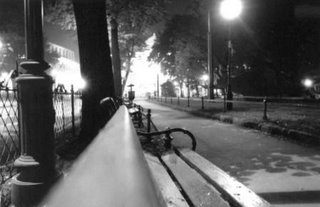Rendezvous In Krakow

I have a busy morning. I change some money at a Kantor - a cheque at a punitive rate 10% below cash - then walk around town looking at hotels. My sister and her partner are flying over to meet me at the weekend and need a room. One 3 star, middle-of-the-road place quotes me 170 pounds a night. I point out that this is more than a 5 star hotel in London ( I don't know if this is true, but it can't be far off ), so they offer me a suite at 230 Pounds instead. At the fourth hotel, I manage to book a room just inside the town wall; when I walk by later in the day I find the road is being dug up with pneumatic drills and diggers - the noise is horrendous.
I try to buy a map of the tram system, but the Information office don't have any; there are so many roadworks that the lines keep being dug up or closed, so they don't bother publishing a map. I walk everywhere instead: through the cobbled streets, the parks with their misty autumnal shades, past synagogues and run-down tenements. I walk through Kazimierz and cross the River Wilsna, pass beneath the railway lines, turn right, then left and left again, and stand infront of Oskar Schindler's factory. It is an unremarkable building next door to a bakery in a bland industrial estate. There isn't much to see: the gates and the offices are original, as is one of the workshops. The rest was added later - after wartime bomb damage - by which time Schindler and his workers were in Czechoslovakia. I climb the stairs to his office and flick through the visitors book. Someone from Bristol asks "why did it happen?", while Jim - from Brisbane - gives his endorsement: "GR8 M8".
I find a Vietnamese bistro hidden in a back alley in the old town and eat for a pittance, then sip a beer at a bar overlooking the square.
In the morning I take the airport shuttle from Krakow Glowny to meet my visitors. It is a modern diesel multiple unit, and the service is franchised out to a private operator who've made great efforts to market it. There are posters and glossy leaflets at the station which promise a fast, efficient service - your best connection to the airport. Unfortunately, it doesn't quite make it all the way to the airport: after a slow wander across fields and un-gated level crossings where we squeeze past cars that get too close to the line, the train stops at a halt. Here there is a bus waiting to take us the last half-mile to the terminal, and a scene of chaos as people heave and drag their luggage between the two.
Once Clodagh and Iain are checked into the hotel - the noise of the roadworks having been replaced by buskers as its a Saturday - we retrace my steps to Schindler's factory, then set out to find the remaining pieces of the ghetto walls. I ask the guide at the factory for directions and he points me towards the ringroad and tells me to walk for a kilometer. We decide to take a tram instead, and find that the station is actually in the former ghetto, no more than five minutes from the factory. We find one short section of wall overlooked by an old townhouse that would have been inside the ghetto, and wonder who could live in a place with such a dark past.
Iain has brought a guide book and finds a nice restaurant with good food and reasonable prices; I haven't room to carry a guide so usually take pot-luck, but can't deny their usefulness. We arrange to meet in the morning for a train to Oswiecim, a town overshadowed by the name it was given by occupying German forces - Auschwitz.
We have no problem buying tickets, and although slow, we arrive at the town's main station with the best part of a day at our disposal. We have decided to tour the camps of Auschwitz and Birkenau independently, and later agree that it was wise to do so: the organised tours are hurried and allow no time whatsoever for personal contemplation, skimming over a few details before moving to the next exhibit.
I am not going to write my impressions or observations of the two museums - there really is nothing I could say that is not deeply personal and private, not to mention inadequate.
Clodagh and Iain have brought me books, socks, and English conversation; each of these have assumed immeasurable value over the weeks I have been traveling, things to be savored and treasured. They return to England on Tuesday; I leave them at their hotel after breakfast and walk to the station, feeling a little sad, wondering when - and where - our next rendezvous will be.

0 Comments:
Post a Comment
<< Home